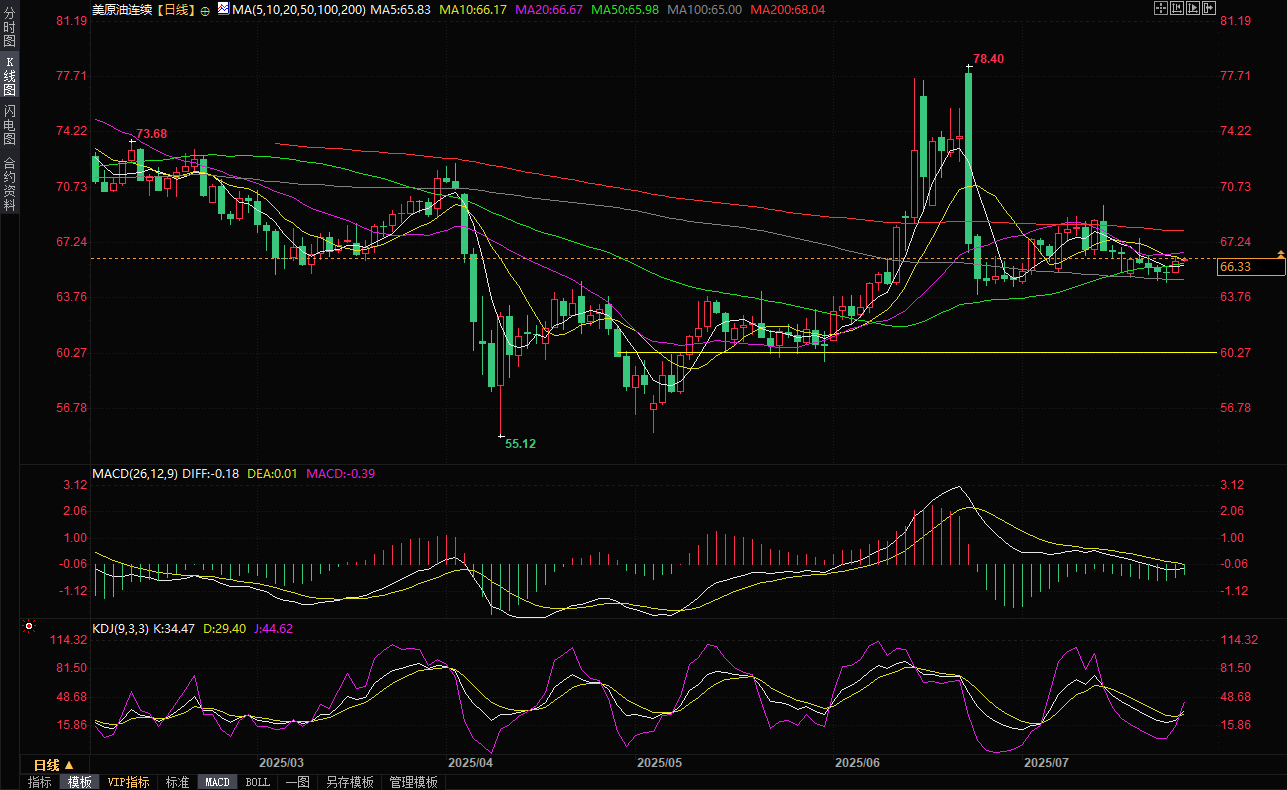Crude oil trading reminder: Oil prices are far away from the 100-day moving average, inventory drops, supply concerns and geopolitical games
2025-07-25 09:43:16

Inventory decline and supply concerns: the direct driver of oil price increases
U.S. inventories fall more than expected
The latest data from the U.S. Energy Information Administration (EIA) showed that U.S. crude oil inventories fell by 3.2 million barrels last week, with the total falling to 419 million barrels. This decline far exceeded market expectations. Analysts in a Reuters survey had expected inventories to fall by only 1.6 million barrels. The significant decline in inventories reflects the strong domestic demand for crude oil in the United States and potential pressure on the supply side, providing solid support for oil prices to rise. Janiv Shah, energy analyst at Rystad, pointed out that the rapid decline in inventories has injected confidence into the market, especially against the backdrop of the gradual recovery of global energy demand, this data is particularly critical.
The impact of Russia's gasoline export restrictions
At the same time, news that Russia plans to restrict gasoline exports further pushed up oil prices. It is reported that Russia may suspend gasoline exports to international markets except for a few allies and countries with supply agreements (such as Mongolia). Phil Flynn, senior analyst at Price Futures Group, said that this news provides a reason for the market to rise, because the tightening of global gasoline supply will directly affect the price of refined oil, thereby pushing up crude oil demand expectations. As one of the world's major energy exporters, any supply adjustment by Russia is enough to cause market shocks.
Venezuela: Chevron's unexpected positives and market concerns
Trump administration's "limited release" for Venezuela
Oil prices briefly retreated during the session due to geopolitical news. There are reports that the incoming Trump administration may allow Chevron to resume limited oil production in Venezuela. The news surprised the market, and John Kilduff, partner of Again Capital LLC, bluntly stated that this is a "unique one-time exception." The market generally believes that the Trump administration will not further relax restrictions on other US oil companies, so the impact of this policy may be relatively limited. Nevertheless, Chevron's potential return may still bring incremental global crude oil supply, which will suppress oil prices to a certain extent in the short term.
Markets cautious about Venezuela's production increase
Although Venezuela has abundant crude oil reserves, its oil industry has long been constrained by sanctions and technical bottlenecks. Even if Chevron resumes production, its production growth may take a long time to achieve gradually, and it is difficult to significantly change the global supply pattern in the short term. Therefore, the market's reaction to this news is relatively complicated, with both concerns about increased supply and rational judgments on the limited actual impact.
Global trade and geopolitics: external drivers of oil prices
Potential positives from US-EU trade talks
The early rise in oil prices was also boosted by progress in U.S.-EU trade talks. According to two European diplomats, the United States and the European Union are working to reach a trade deal that may include a 15% base tariff on EU imports and exemptions for some goods. The news has injected optimism into the market, as the reduction of trade barriers could stimulate global economic recovery and boost energy demand. Janiv Shah said that the positive progress in trade talks provided additional support for oil prices, especially as the global economy gradually recovers from the impact of the epidemic.
The complex impact of the situation in Gaza
In terms of geopolitics, the twists and turns of the Gaza ceasefire negotiations have also added uncertainty to oil prices. Israel and the United States recalled their delegations to the Gaza ceasefire negotiations, and US envoy Witkoff accused Hamas of lacking sincerity in the negotiations. Hamas countered that its position was welcomed by the mediators and said it was ready for a comprehensive agreement. However, the back and forth of the negotiations and the tense situation in the region have increased market concerns about the stability of the Middle East. As a key region for global crude oil supply, any turmoil in the Middle East may trigger the risk of supply disruptions, thereby indirectly pushing up oil prices.
Humanitarian crises and international responses
The humanitarian situation in Gaza continues to deteriorate, and British Prime Minister Starmer announced that he would hold an emergency meeting with the leaders of France and Germany to discuss how to ease the crisis. This situation has not only attracted great attention from the international community, but may also further affect oil prices through geopolitical risk premiums. The market's continued attention to the situation in the Middle East makes it difficult for oil prices to get rid of the shadow of geopolitics in the short term.
Future Outlook: Opportunities and Challenges of Oil Price Trends
In general, the current rise in oil prices is the result of multiple factors. The unexpected decline in US crude oil inventories and the potential restrictions on Russian gasoline exports provide the market with direct upward momentum, while the progress of US-EU trade negotiations has added confidence to the recovery of global energy demand. However, the complexity of the situation in Venezuela and the geopolitical uncertainty in Gaza have also brought variables to the trend of oil prices. In the future, investors need to pay close attention to global supply dynamics, policy changes in major oil-producing countries, and the evolution of the geopolitical situation to determine the next wave of oil price trends.

(Daily chart of the main contract of US crude oil, source: Yihuitong)
At 09:40 Beijing time, U.S. crude oil is currently trading at $66.31 per barrel.
- Risk Warning and Disclaimer
- The market involves risk, and trading may not be suitable for all investors. This article is for reference only and does not constitute personal investment advice, nor does it take into account certain users’ specific investment objectives, financial situation, or other needs. Any investment decisions made based on this information are at your own risk.





















